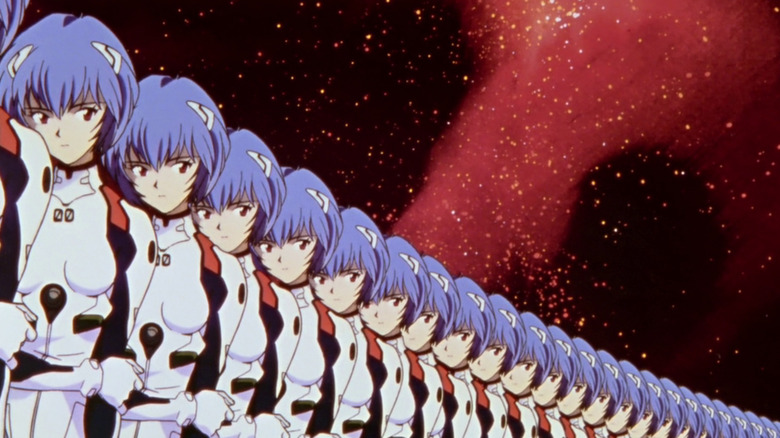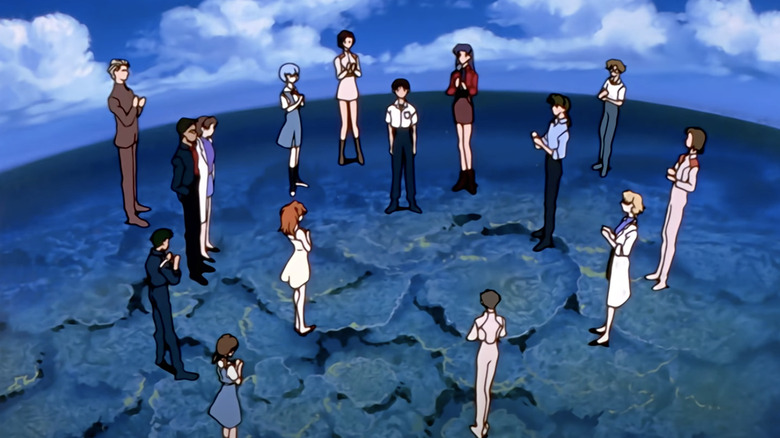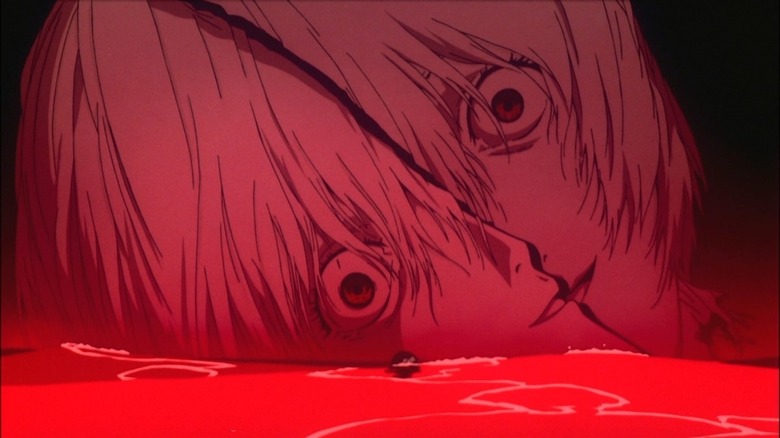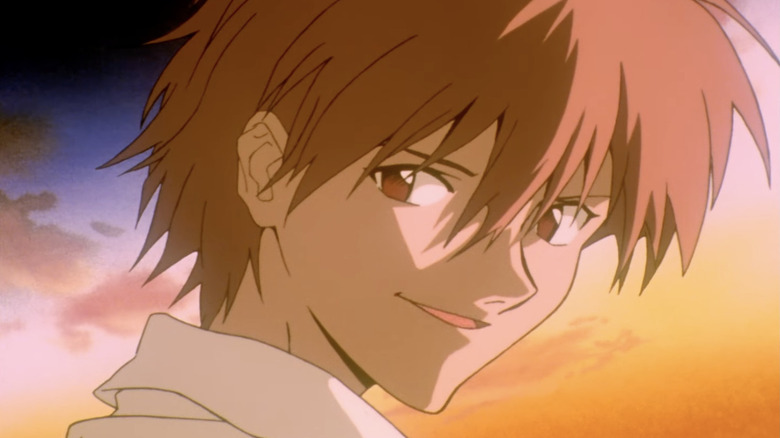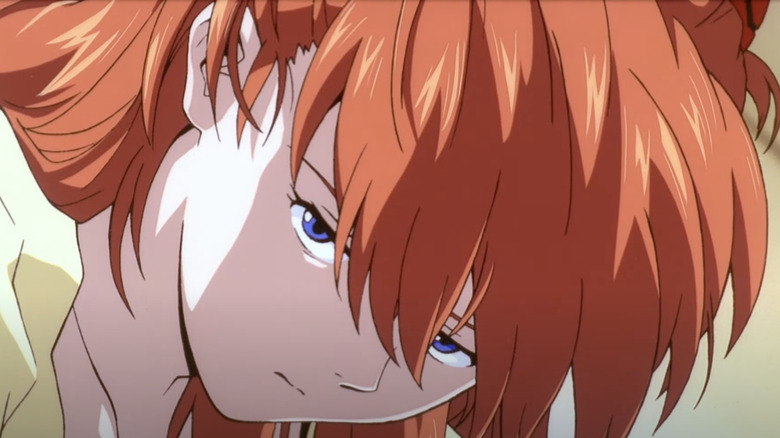There's No Wrong Way To Interpret Neon Genesis Evangelion
The following article contains discussion of abuse and suicide.
In the final episode of "Neon Genesis Evangelion," Shinji Ikari experiences an alternate reality where he and his friends are the leads in a slice-of-life rom-com instead of a mecha show. The lesson? There are endless possibilities and his life can be anything he wants.
"Evangelion" is a dense show, both textually and visually. It employs surreal imagery and rapid editing; some scenes look like you're watching them through a kaleidoscope. On top of that, it forces you to piece together its lore on your own. There's nary a MacGuffin or symbol in the show that isn't named for Judeo-Christian theology.
Since "Evangelion" never holds the audiences' hand, it's been subjected to countless, conflicting interpretations. Matt Greenfield, who wrote the first English dub of "Evangelion" for ADV Films, outright called the anime, "a Rorschach test" — what you get out of it is what you bring into it.
Series creator Hideaki Anno gave his take on this in a 2021 interview with Collider. Asked if he feels "Evangelion" has been misinterpreted, particularly by people who've never suffered depression like Anno and his characters have, he answered:
"I think that interpretation and misinterpretation is something that always happens. And when we create things, we always try to narrow that range, but it's totally up to the people who receive it. So, it's easier, I think, for people who are in similar situations as the protagonist to feel the themes but that's not the only people that we're aiming the show for. We're actually aiming the show for various people. So, we're trying to tell a story that a lot of people can get something out of."
Let's look at what some have gotten out of "Evangelion."
Conflicting endings
One of the biggest sticking points of "Evangelion" is its endings. Yes, endings, because there's more than one. The last two episodes of "Evangelion" threw conventional narrative to the wind and employed experimental, sometimes unfinished animation. Despite the weirdness, it was a happy ending — Shinji decides he has the power to love himself and live, and everyone else claps, saying "congratulations" one by one. Fans weren't pleased, but the second ending, a movie titled "The End of Evangelion," only created more strife.
Both episode 26 and the movie are about the commencement of "The Human Instrumentality Project," wherein all of humanity joins together as one being. A major theme of "Evangelion" is how human beings coexist as individuals and how hard that makes communication. Everyone's walls tumbling down is the natural end point. The TV series glosses over how this happened, but the movie shows it in detail: the angel Lilith dissolves everyone's bodies into the orange fluid LCL and absorbs their souls, leaving the Earth devastated and blood-red.
Shinji, mentally broken by a series' worth of trauma, is the one who starts Instrumentality. After his fellow pilot Asuka Langley Soryu gives him brutal honesty instead of solace, he strangles her and decides that for all he cares, humanity can die. Once all are one, Shinji rejects this new reality. His mantra throughout "Evangelion" has been "I musn't run away" and he once more follows it, returning to the physical world. By the final scene, Asuka has returned too.
It's certainly not the most straightforward ending. How you respond to and interpret "End of Evangelion" depends on what you latch onto about the story and which characters you are most sympathetic towards.
Is it okay for me to be here?
Is "The End of Evangelion" a black mirror of the TV ending, where Shinji's self-loathing grows so much that it swallows humanity whole? Or is it a complementary conclusion, one which has the same life-affirming message as the TV series, just delivered with brutal honesty?
The former would point to the world's ruined state and how in the final scene Shinji, again, lashes out at Asuka. His cyclical actions show how self-loathing harms everyone around you. If you keep others at arm's length, they'll be happy to stay there. Some have even argued the film is Anno's hate letter to the fans who rejected the first ending. The film includes shots of the vandalized Gainax office (the studio which animated "Evangelion") and when Asuka tells Shinji "I'd rather die than do it with you," the film smash-cuts to a movie theater in the real world.
Then there's the hopeful reading which, I'll be honest, I prefer. This interpretation is contingent on one key detail: Instrumentality is an allegory for suicide. As Instrumentality commences, Shinji declares he wants to die and the accompanying song, "Komm Süsser Tod" (German for "Come, Sweet Death"), gives voice to these feelings. Once he experiences nothingness, he realizes he was wrong. Non-existence is painless, but also joyless. Remembering his friends, Shinji decides he'd rather open his heart to hurt than shut it off completely. Shinji's problems aren't over — far from it — but there's victory in choosing to live. By doing so, he has a chance to find happiness, which is better than simply quitting. It's a lesson those who've suffered like Shinji, and Anno himself, can hopefully one day learn.
Translation begets division
Another reason "Evangelion" has so many different interpretations is because of how it's spread all over the globe. Many who watch it have to rely on subtitles to understand its Japanese dialogue or just watch it dubbed. Anime dubs are rarely precise translations of the originals, since Japanese wordplay or cultural contexts can't always carry over to English. How you interpret "Evangelion" will depend on which version of it you view.
Some have even argued that episode 26's ending is not optimistic, but insidiously depicts Shinji accepting Instrumentality. This stems from English dub dialogue using the phrase, "this world isn't that bad," with "this world" potentially meaning either physical reality or the nether-realm of joined souls. The Japanese had the clearer, "Genjitsu Sekai," meaning, "the real world." The dub wound up being even more ambiguous than the original.
One last layer of complication: there's two English dubs of "Neon Genesis Evangelion" (let's not even get into the "Rebuild" movies). The series was first dubbed by ADV Films throughout 1996 through 1998. In 2019, when Netflix acquired distribution rights, they re-dubbed the series with a different cast and script. The Netflix dub translates more literally, which led to controversy among longtime fans when the translations conflicted with their accepted-interpretations.
In particular, there's the character of Kaworu. In episode 24, he affectionately tells Shinji, "Suki tte koto sa." ADV Films translated this as, "I Love You," while Netflix went with the more ambiguous, "I like you." Sometimes, leaving too much room for interpretation robs a moment of its power.
Translating a story is always a judgment call, since many languages simply don't sync up one-to-one. Thus, it's important to remember that translators aren't always the arbiter. Their interpretation can be one of many.
How disgusting...
Then there's the last moment of "End of Evangelion." As Shinji strangles Asuka, she caresses his cheek. Shinji stops and cries while Asuka coldly stares, declaring, "Kimochi Warui." This is a Japanese phrase conveying unease and dislike. There's no exact English equivalent, so the dubs settled for "(How) disgusting." This doesn't make it any clearer why Asuka says this. Is the current sight of Shinji crying or is she recalling how he violated her when, in the film's opening, he masturbated to the sight of her unconscious body?
While Shinji certainly stops because of the unexpected affection from Asuka, why does he strangle her in the first place? Does he simply hate Asuka, especially the parts of himself he sees reflected in her? Or is it because, as one source has suggested, he wants to confirm the existence of "the other," to experience rejection so he can be sure his feelings are real? In a scene devoid of dialogue, all the characters have to speak for themselves are their actions. Here, even those actions aren't enough for a definite answer.
Ambiguity can seem like a cheat in storytelling, but here, it's anything but. The makers of "Neon Genesis Evangelion" trust their audience to make up their own minds. That so many have come to widely different conclusions about the show and its characters means that Anno succeeded in his goal to make a story that could resonant with all types of people for all different reasons.
If you or a loved one is in crisis, please reach out to the 988 Suicide & Crisis Lifeline, available at the toll-free number 988, to talk to someone who can help.
